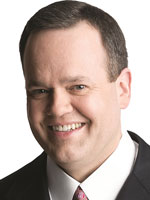Civility: It’s not a four-letter word
CAALA Partners with Association of Southern California Defense Counsel and the American Board of Trial Advocates on civility conference on civility program
I was recently in a lawyer’s office, and he had a card sitting on his desk. On the front of the card was a picture of a woman and a man having a conversation. The caption for the woman stated, “All lawyers are a-holes.”
In response, the man stated, “I resent that remark.”
Inside the card was the same photo with the woman responding, “Why, are you a lawyer?” to which the man replied, “No, I’m an a-hole.”
After I got done chuckling, it got me thinking about the problems we have in our profession when there is a lack of civility; so I decided to devote this month’s column to the topic.
The following is the oath given to new attorneys being sworn in to practice law in California:
I solemnly swear (or affirm) that I will support the Constitution of the United States and the Constitution of the State of California, and that I will faithfully discharge the duties of an attorney and counselor at law to the best of my knowledge and ability. As an officer of the court, I will strive to conduct myself at all times with dignity, courtesy, and integrity.
Notably, the last sentence, that says you will strive to conduct yourself with “dignity, courtesy, and integrity,” was adopted by the California Supreme Court on April 23, 2014 and made effective May 23, 2014. Perhaps I’m stating the obvious, but I think everyone agrees that acting with dignity, courtesy and integrity is something that we all should strive to do; not only in practicing law, but in every aspect of life. Acting with dignity, courtesy, and integrity is the hallmark of civility.
Perhaps the best way to appreciate the benefits of civility is to think of the negative consequences that come when there is a lack of it. Think of the extra fights, letters, emails, motions and just wasted energy and time because one or both sides are not conducting themselves with civility. And the best trial lawyers, the ones who consistently get great results trying cases to juries, are usually the most civil lawyers. Why? Because juries like civil lawyers.
Contrary to what some think, civility is not a sign of weakness. Just the opposite; being civil demonstrates strength. It shows confidence in both yourself and your case when you are pleasant in dealing with your opposing counsel. Sure, there will be disagreements which are inherent in practicing law and trying cases. But it’s knowing which fights to pick, and how you conduct yourself during those fights, that is the artistry of being a great trial lawyer. Some battles are not worth fighting and should be resolved with stipulations. Others need to be fought, and fought hard. Fighting about the issues does not mean that you can’t be civil in dealing with opposing counsel.
In keeping with the goal of improving civility, CAALA is partnering with the Association of Southern California Defense Counsel (ASCDC) and the American Board of Trial Advocates (ABOTA) on two very exciting programs.
On May 24, 2017, CAALA, ASCDC and ABOTA will present a “Joint Litigation Conference: Promoting Civility and Ethics in the Courtroom.” It will be held at the LA Hotel Downtown located at 333 S. Figueroa St., in downtown Los Angeles. The program will go from 4:00 p.m. to 6:30 p.m. followed by a reception from 6:30 p.m. to 8:30 p.m.
Speakers will include Los Angeles Superior Court Presiding Judge Dan Buckley and Assistant Presiding Judge Kevin Brazile, as well as some of the most highly respected trial lawyers from both the plaintiff and defense bar. In addition, all sitting Los Angeles County judges will be invited and we expect a great turnout from both the bar and the bench. It promises to be a great event.
Another program that CAALA is working on with ASCDC, ABOTA, and the Los Angeles County Superior Court is a pilot Mandatory Settlement Conference Program.
Beginning on May 15, 2017, at the Final Status Conference of cases assigned to the PI Hub, certain cases, at the Court’s discretion, will be ordered to an MSC. As part of the order, the parties will be required to have their decision-makers present at the MSC, which will be conducted between the Final Status Conference and the start of trial. Two MSCs will occur every Monday, Wednesday and Friday, one in the morning and one in the afternoon. The MSCs will be conducted by two settlement officers per case, one plaintiff and one defense attorney, who will be volunteers from CAALA, ASCDC and ABOTA.
There has already been a very positive response from CAALA, ASCDC and ABOTA members volunteering to be settlement officers. The hope is that with the three organizations working together, the MSC program will get cases resolved and relieve some of the congestion in the PI Hub.
As trial lawyers, we are all zealous advocates for justice on behalf of our clients. But that does not mean that we can’t be civil in the process. Indeed, our profession demands it. In the end, we will be better lawyers and obtain more just results for our clients if we adhere to our code of civility.
Ricardo Echeverria

Ricardo Echeverria is a trial attorney with Shernoff Bidart Echeverria LLP, where he handles both insurance bad-faith and catastrophic personal-injury cases. Hewas named the 2010 CAALA Trial Lawyer of the Year, the 2011 Jennifer Brooks Lawyer of the Year by the Western San Bernardino County Bar Association, and a 2012 Outstanding Trial Lawyer by the Consumer Attorneys of San Diego. He was also a finalist for the CAOC Consumer Attorney of the Year Award in both 2007 and 2009, and is also a member of ABOTA and the American College of Trial Lawyers.
Copyright ©
2026
by the author.
For reprint permission, contact the publisher: Advocate Magazine
